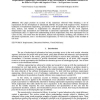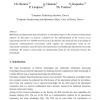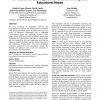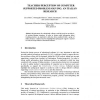129
click to vote
ETS
2002
IEEE
15 years 1 months ago
2002
IEEE
We develop a scheme for representing critical non-functional requirements (NFRs), and apply it to the domain of multimedia educational software (MES) to validate it. Our approach ...
116
click to vote
CLEIEJ
2006
15 years 2 months ago
2006
: This paper presents an account of the experience observed when obtaining a set of requirements for the development of educational software for people with impaired vision. Numero...
IFIP3
1998
15 years 3 months ago
1998
Multimedia and hypermedia had and still have a tremendous impact on the evolution of educational software. In this paper we propose a platform for the implementation of the servic...
107
click to vote
WEBNET
2001
15 years 3 months ago
2001
: In this paper we evaluate educational software, available in the market, designed for the purpose of teaching programming that addresses mainly beginners and intermediate student...
131
click to vote
ACMIDC
2010
15 years 3 months ago
2010
We have developed an educational software tool (Aprendiendo) to reinforce the learning process of children with special educational needs. This tool makes use of a variety of inte...
109
click to vote
ICSE
2000
IEEE-ACM
15 years 5 months ago
2000
IEEE-ACM
This paper describes E-Slate (http://E-Slate.cti.gr), an exploratory learning environment that builds on a componentbased approach, to enable end-users to create educational softw...
152
click to vote
ECTEL
2006
Springer
15 years 5 months ago
2006
Springer
Requirements for educational software could be based on an analysis of existing learning situations. In order to obtain useful information about teaching practices, an explorative ...




